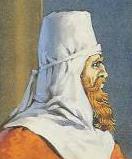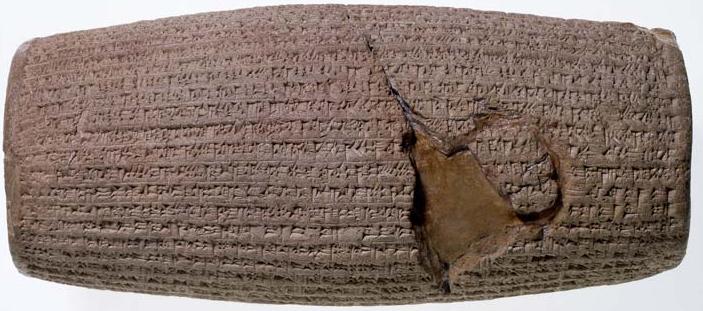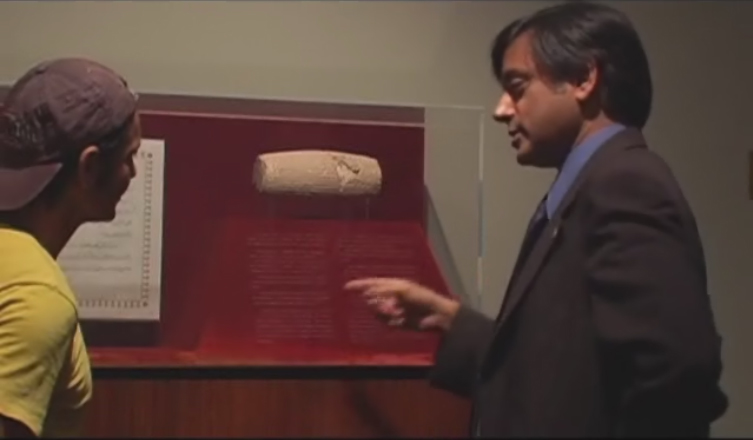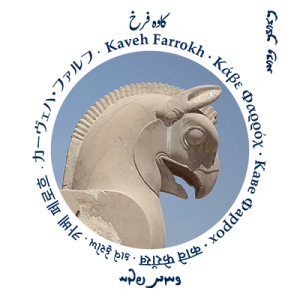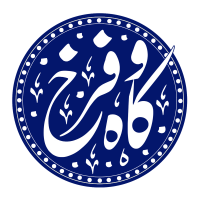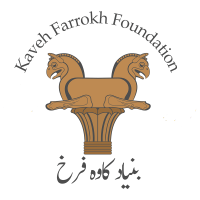The following article has been written by Dr. Mosi Dorbayani and first appeared in the Human Rights Evolution website.
================================================================================
The First Human Rights Charter
The Cyrus Cylinder is the first charter of right of nations in the world. It is a baked-clay cylinder in Akkadian language with cuneiform script. This cylinder was excavated in 1879 by the Assyro-British archaeologist Hormuzd Rassam in the foundations of the Esagila (the Marduk temple of Babylon) and is kept today in the British Museum in London. On October 12 (Julian calendar; October 7 by the Gregorian calendar) 539 BC, Achaemanid army without any conflict entered the city of Babylon. Cyrus the Great himself, on October 29, entered the city, assuming the titles of “king of Babylon, king of Sumer and Akkad, king of the four corners of the world”. Cyrus The Great, on this cylinder, describes how he conquers the old city of Babylon and how his mighty army in peace marched into the city and mentions his decrees.
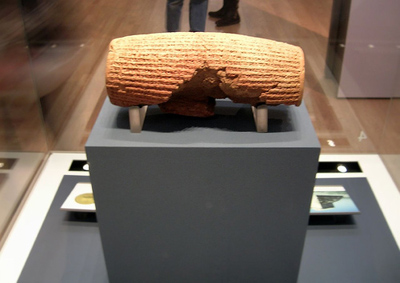 Cyrus Cylinder housed at the British Museum.
Cyrus Cylinder housed at the British Museum.
His decrees cover three main premises:
The Cyrus Cylinder then was placed under the walls of “Esagila” as a foundation deposit, following a Mesopotamian tradition.
Passages in the text of cylinder have been interpreted as expressing Cyrus’ respect for humanity, and as promoting a form of religious tolerance and freedom; and as result of his generous and humane policies, Cyrus gained the overwhelming support of his subjects.
Cyrus the Great as portrayed by the late Angus McBride.
In 1971, the Cyrus Cylinder was described as the world’s first charter of human rights, [1, 2, 3, 4] and it was translated into all six official U.N. languages. [4] A replica of the cylinder is kept at the United Nations Headquarters in New York City in the second floor hallway, between the Security Council and the Economic and Social Council chambers. [5]
The size of Cyrus Cylinder is 23 cm long, 11 cm wide with 40+ lines of writing (although broken) and it is dated 539 BCE.
Translation of Cyrus Cylinder
| Transliteration (Rogers 1912: 380-84) | Translation (Adapted from Rogers 1912: 380-84) | |
| 1 | [. . . . . . . . . . . . . . . . . . . . . . . . . .]-ni-Šu | [. . . . . . . . . . . . . . . . . . . . . . .] his troops |
| 2 | [. . . . . . . . . . . . . . . . . . . . . . . .]-ki-ib-ra-tim | [. . . . . . . . . . . . four] quarters of the world |
| 3 | [. . .]-ka gal ma tu-û i Š -Šak-na a-na e-nu-tu ma-ti- Šu | [. . .] a weakling was established as ruler over his land |
| 4 | Ši-[. . . . . . . . . . ta-am]-Ši-li ú- Ša-aŠ-ki-na si-ru-Š u-un | and [. . . . .] a similar one he appointed over them, |
| 5 | ta-am-Ši-li É-sag-ila i-te-[. . . . . . -ti]m a-na Uriki ù si-it-ta-tim ma-ha-za | like Esagila he made [. . .] to Ur and the rest of the cities, |
| 6 | pa-ra-as la si-ma-a-ti- Šu-nu ta-[. . . . . l]i û-mi- Šá-am-ma id-di-ni-ib-bu-ub ù ana na-ak-ri-tim | a command dishonouring them [. . . . .] he planned daily and in enmity, |
| 7 | sat-tuk-ku ù-Šab-ti-li ú-ad-[di . . . . . . iŠ] -tak-ka-an ki-rib ma-ha-zi pa-la-ha iluMarduk Šar ilâni [Šá]-qi- Še a-Šu-uŠ- Šu | he caused the daily offering to cease; he appointed [. . .] he established within the city. The worship of Marduk, king of the gods [ . . . ] |
| 8 | li-mu-ut-ti ali-Šu [i-te]-ni-ip-pu-uŠ û-mi- Šá-am-ma na-[. . . . niŠe ] i-na ab-Ša-a-ni la ta-ap-Š ú-úh -tim ú-hal-li-iq kul-lat-si-in | he showed hostility toward his city daily[. . .] his people; he brought all of them to ruin through servitude without rest. |
| 9 | a-na ta-zi-im-ti-Ši-na iluEllil lililani iz-zi-iŠ i-gu-ug-ma [. . .] ki-su-úr-Šú-un ilâni a- Ši-ib lib-bi-Š ú-nu i-zi-bu ad-ma-an- Šú-un | On account of their complaints, the lords of the gods became furiously angry and left their land; the gods, who dwelt among them, left their homes, |
| 10 | i-na ug-ga-ti Šá ú- Še-ri-bi a-na ki-rib Babili ilu Marduk ti-[. . . .] li-sa-ah-ra a-na nap-har da-ád-mi Šá in-na-du-ú Šú-bat-su-un | in anger over his bringing into Babylon. Marduk [. . .] to all the dwelling places, which had become ruins, |
| 11 | ù niŠe mât Šú-me-ri ù Ak-ka-dikiŠ a i-mu-ú Ša-lam-ta-aŠ ú-sa-ah–hi-ir ka- [. . . .]– Ši ir-ta-Š i ta-a-a-ra kul-lat ma-ta-a-ta ka-li- Ši-na i-h i-it ib-ri-e-Šu | and the people of Sumer and Akkad, who were like corpses [. . . .] he turned and granted mercy. In all lands everywhere |
| 12 | iŠ-te-‘-e-ma ma-al-ki i- Ša-ru bi-bil lib-bi Šá it-ta-ma-a h qa-tu-uŠ-Šú m Ku-ra-aŠŠar ali An- Šá-an it-ta-bi ni-bi-it-su a-na ma-li-ku-tim kul-la-ta nap- h ar iz-zak-ra Šú-[ma- Š u] | he searched; he looked through them and sought a righteous prince after his own heart, whom he took by the hand. He called Cyrus, king of Anshan, by name; he appointed him to lordship over the whole world. |
| 13 | mâtQu-ti-i gi-mir Um-man Man-da ú-ka-an-ni- Ša a-na Š e-pi-Šu ni Še sal-mat qaqqaduduŠa ú- Š á-ak-Ši-du ka-ta-a-Šu | The land of Qutu, all the Umman-manda, he cast down at his feet. The black-headed people, whom he gave his hands to conquer, |
| 14 | i-na ki-it-tim ú mi-Š a-ru iŠ-te-ni-‘e-Ši-na-a-tim iluMarduk belu rabu ta-ru-ú niŠ e- Šu ip-Še-e-ti Šá dam-qa-a-ta ù lib-ba-Šú i-Šá-ra ha-di-i Š ip-pa-al-li-is | he took them in justice and righteousness. Marduk, the great lord, looked joyously on the caring for his people, on his pious works and his righteous heart. |
| 15 | a-na ali-Šú Bab-ilani ki a-la-ak-Šú ik-bi ú- Š a-as-bi-it-su-ma har-ra-nu Babili ki-ma ib-ri ú tap-pi-e it-tal-la-ka i-da-a-Šu | To his city, Babylon, he caused him to go; he made him take the road to Babylon, going as a friend and companion at his side. |
| 16 | um-ma-ni-Šu rap- Ša-a-tim Šá ki-ma me-e nari la ú-ta-ad-du-ú ni-ba-Šú-un kakke-Š ú-nu sa-an-du-ma i-Šá-ad-di- ha i-da-a- Šú | His numerous troops, in unknown numbers, like the waters of a river, marched armed at his side. |
| 17 | ba-lu qab-li ù ta-ha-zi ú- Še-ri-ba-aŠ ki-rib Babili ala- Šú Bab-ilaniki i-ti-ir i-na Š ap-Šá-ki m, iluNabu-na’id Šarru la pa-li-hi-Š ú ú-ma-al-la-a qa-tu-u Š- Šu | Without battle and conflict, he permitted him to enter Babylon. He spared his city, Babylon, a calamity. Nabonidus, the king, who did not fear him, he delivered into his hand. |
| 18 | niŠe Babili ka-li- Šú-nu nap-har mâtŠ ú-me-ri u Ak-ka-diki ru-bi-e ù Š ak-ka-nak-ka Šá-pal-Š ú ik-mi-sa ú-na-aŠ -Š i-qu Še-pu-u Š- Šú ih-du-ú a-na Š arru-ú-ti- Šú im-mi-ru pa-nu-uŠ – Šú-un | All the people of Babylon, Sumer, and Akkad, princes and governors, fell down before him and kissed his feet. They rejoiced in his sovereignty; their faces shone. |
| 19 | be-lu Šá i-na tu-kul-ti- Šá ú-bal-li-tu mi-tu-ta-an i-na bu-ta-qu ú pa-ki-e ig-mi-lu kul-la-ta-an ta-bi-iŠ ik-ta-ar-ra-bu- Šu iŠ-tam-ma-ru zi-ki-ir-Š ú | The lord, who by his power brings the dead to life, who amid destruction and injury had protected them, they joyously blessed him, honoring his name. |
| 20 | a-na-ku mKu-ra-aŠ Šar kiŠ-Š at Šarru rabu Šarru dan-nu Š ar Babili Šar mât Š ú-me-ri ú Ak-ka-di Šar kib-ra-a-ti ir-bit-tim | I am Cyrus, king of the world, the great king, the powerful king, king of Babylon, king of Sumer and Akkad, king of the four quarters of the world, |
| 21 | mar mKa-am-bu-zi-ia Šarru rabu Šar alu An-Š á-an mar mari mKu-ra-aŠ Šarru rabu Šar alu An-Š á-an ŠA.BAL.BAL m Š i-iŠ-pi-iŠ Š arru rabu Šar alu An-Š a-an | son of Cambyses, the great king, king of the city of Anshan, grandson of Cyrus, the great king, king of the city of Anshan; great-grandson of Teispes, the great king, king of the city of Anshan; |
| 22 | ziru da-ru-ú Ša Šarru-ú-tu Ša iluBel u ilu Nabu ir-a-mu pa-la-a-Š ú a-na tu-ub lib-bi- Šú-nu i h-Ši-ha Šarru-ut-su e-nu-ma a-na ki-rib Babili e-ru-bu sa-li-mi-i Š | eternal seed of royalty whose rule Bel and Nabu love, in whose administration they rejoice in their heart. When I made my triumphal entrance into Babylon, |
| 23 | i-na ul-si ù ri- Š á-a-tim i-na ekal ma-al-ki ar-ma-a Š ú-bat be-lu-tim iluMarduk belu rabu lib-bi ri-it-pa- Š ú Šá mare Babili ú . . . an-ni-ma û-mi- Šam a-Š e-‘-a pa-la-ah– Šú | I took up my lordly residence in the royal palace with joy and rejoicing; Marduk, the great lord, moved the noble heart of the residents of Babylon to me, while I gave daily attention to his worship. |
| 24 | um-ma-ni-ia rap-Ša-tim i-na ki-rib Babili i-Šá-ad-di-ha Šú-ul-ma-niŠ nap-har mat [ Šu-me-ri] ù Akkadiki mu-gal-[l]i-tim ul ú- Šar-Ši | My numerous troops marched peacefully into Babylon. In all Sumer and Akkad I permitted no enemy to enter. |
| 25 | dannat Babili ù kul-lat ma-ha-zi- Šu i-na Šà-li-im-tim a Š -te-‘-e mare Babi[li . . .] ki ma-la lib-[. . .]-ma ab- Š a-a-ni la si-ma-ti-Šu-nu Š ú-bat-su-un | The needs of Babylon and of all its cities I gladly attended to. The people of Babylon [and . . .], and the shameful yoke was removed from them. Their dwellings, |
| 26 | an-hu-ut-su-un ú-pa-a Š -Ši-ha ú-Š á-ap-ti-ir sa-ar-ba- Šu-nu a-na ip- Še-e-ti-[ia] iluMarduk belu rabu ú-ih-di-e-ma | which had fallen, I restored. I cleared out their ruins. Marduk, the great lord, rejoiced in my pious deeds, and |
| 27 | a-na ia-a-ti mKu-ra-a ŠŠarru pa-li-ih-Š u ù mKa-am-bu-zi-ia mari si-it lib-bi-[ia ù a]-na nap- har um-ma-ni-ia | graciously blessed me, Cyrus, the king who worships him, and Cambyses, my own son, and all my troops, |
| 28 | da-am-ki-iŠ ik-ru-ub-ma i-na Ša-lim-tim ma-har-Š a ta-bi-iŠ ni-it-ta-[‘-id i-lu-ti- Šu] sir-ti nap-har Šarri a- Ši-ib parakke | while we, before him, joyously praised his exalted godhead. All the kings dwelling in palaces, |
| 29 | Ša ka-li-i Š kib-ra-a-ta iŠ-tu tam-tim e-li-tim a-di tam-tim Šap-li-tim a-Ši-ib kul-[. . . .] Šar-ra-ni mati A-mur-ri-i a- Ši-ib kuŠ-ta-ri ka-li-Š u-un | of all the quarters of the earth, from the Upper to the Lower sea dwelling [. . .] all the kings of the Westland dwelling in tents |
| 30 | bi-lat-su-nu ka-bi-it-tim ú-bi-lu-nim-ma ki-ir-ba Babili ú-na-aŠ-Š i-qu Še-pu-ú-a iŠ-tu [. . . .] a-di alu A ŠŠurki ù Šu-Š anki | brought me their heavy tribute, and in Babylon kissed my feet. From [. . .] to Asshur and Susa, |
| 31 | A-ga-deki mâtu E Š -nu-nak aluZa-am-ba-an aluMe-túr-nu Deriki a-di pa-at mât Qu-ti-i ma-ha-za [ Šá e-bir]-ti nâruDiqlat Š á i Š-tu ap-na-ma na-du-ú Šú-bat-su-un | Agade, Eshnunak, Zamban, Meturnu, Deri, with the territory of the land of Qutu, the cities on the other side of the Tigris, whose sites were of ancient foundation— |
| 32 | ilâni a-Ši-ib lib-bi- Šu-nu a-na aŠ-ri-Šú-nu ú-tir-ma ú-Šar-ma-a Š ú-bat da-er-a-ta kul-lat niŠe- Šu-nu ú-pa-ah –hi-ra-am-ma ú-te-ir da-ád-mi- Šu-un | the gods, who resided in them, I brought back to their places, and caused them to dwell in a residence for all time |
| 33 | ù ilâni mât Šú-me-ri ù AkkadikiŠ á m, iluNabu-na’id a-na ug-ga-tim bel ilâni ú- Še-ri-bi a-na ki-rib Babili i-na ki-bi-ti iluMarduk belu rabû i-na Š á-li-im-tim | And the gods of Sumer and Akkad—whom Nabonidus, to the anger of the lord of the gods, had brought into Babylon—by the command of Marduk, the great lord, |
| 34 | i-na maŠ-ta-ki- Šu-nu ú-Še-Ši-ib Šú-ba-at tu-ub lib-bi kul-la-ta ilâni Š a ú-Še-ri-bi a-na ki-ir-bi ma-ha-zi- Šu-un | I caused them to take up their dwelling in residences that gladdened the heart. May all the gods, whom I brought into their cities, |
| 35 | û-mi-Ša-am ma- h ar iluBel ù iluNabu Š a a-ra-ku ume-ia li-ta-mu-ú lit-taŠ-ka-ru a-ma-a-ta du-un-ki-ia ù a-na iluMarduk beli-ia li-iq-bu-ú Ša mKu-ra-aŠ Šarri pa-li- hi-ka u mKa-am-bu-zi-ia mari- Šu | pray daily before Bêl and Nabû for long life for me, and may they speak a gracious word for me and say to Marduk, my lord, “May Cyrus, the king who worships you, and Cambyses, his son, |
| 36 | da [. . .] ib-Šu-nu lu-ú [. . .] ka-li-Ši-na Š ú-ub-ti ni-ih-tim ú-Še- Ši-ib [. . .] paspase u TU.KIR.HU [. . .] | their [. . .] I permitted all to dwell in peace [. . .] |
The above translation of Cyrus the Great Cylinder is the courtesy of K. C. Hanson’s HomePage.

The West Wall in Jerusalem. After his conquest of Babylon, Cyrus allowed Jewish captives in Babylon to return to Israel and rebuild the Hebrew temple. It is believed that approximately 40,000 Jews permanently returned to Israel.
Below is the latest translation of the text by the British Musuem:
[When …] … [… wor]ld quarters […] … a low person was put in charge of his country, but he set [a (…) counter]feit over them. He ma[de] a counterfeit of Esagil [and …] … for Ur and the rest of the cult-cities. Rites inappropriate to them, [impure] fo[od- offerings …] [dis]respectful […] were daily gabbled, and, intolerably, he brought the daily offerings to a halt; he inter[fered with the rites and] instituted […] within the sanctuaries. In his mind, reverential fear of Marduk, king of the gods, ca[me to an e]nd. He did yet more evil to his city every day; … his [people…], he brought ruin on them all by a yoke without relief.
Enlil-of-the-gods became extremely angry at their complaints, and […] their territory. The gods who lived within them left their shrines, angry that he had made them enter into Babylon (Shuanna). Ex[alted Marduk, Enlil-of-the-Go]ds, relented. He changed his mind about all the settlements whose sanctuaries were in ruins and the population of the land of Sumer and Akkad who had become like corpses, and took pity on them. He inspected and checked all the countries, seeking for the upright king of his choice. He took under his hand Cyrus, king of the city of Anshan, and called him by his name, proclaiming him aloud for the kingship over all of everything. He made the land of the Qutu and all the Medean troops prostrate themselves at his feet, while he looked out in justice and righteousness for the black-headed people whom he had put under his care.
Marduk, the great lord, who nurtures his people, saw with pleasure his fine deeds and true heart and ordered that he should go to his city, Babylon. He had him take the road to Tintir, and, like a friend and companion, he walked at his side. His vast troops whose number, like the water in a river, could not be counted, marched fully-armed at his side. He had him enter without fighting or battle right into Shuanna; he saved his city Babylon from hardship. He handed over to him Nabonidus, the king who did not fear him. All the people of Tintir, of all Sumer and Akkad, nobles and governors, bowed down before him and kissed his feet, rejoicing over his kingship and their faces shone. The lord through whose trust all were rescued from death and who saved them all from distress and hardship, they blessed him sweetly and praised his name.
I am Cyrus, king of the universe, the great king, the powerful king, king of Babylon, king of Sumer and Akkad, king of the four quarters of the world, son of Cambyses, the great king,, king of the city of Anshan, grandson of Cyrus, the great king, ki[ng of the ci]ty of Anshan, descendant of Teispes, the great king, king of Anshan, the perpetual seed of kingship, whose reign Bel and Nabu love, and with whose kingship, to their joy, they concern themselves.
When I went as harbinger of peace i[nt]o Babylon I founded my sovereign residence within the royal palace amid celebration and rejoicing. Marduk, the great lord, bestowed on me as my destiny the great magnanimity of one who loves Babylon, and I every day sought him out in awe. My vast troops marched peaceably in Babylon, and the whole of [Sumer] and Akkad had nothing to fear. I sought the welfare of the city of Babylon and all its sanctuaries. As for the population of Babylon […, w]ho as if without div[ine intention] had endured a yoke not decreed for them, I soothed their weariness, I freed them from their bonds(?). Marduk, the great lord, rejoiced at [my good] deeds, and he pronounced a sweet blessing over me, Cyrus, the king who fears him, and over Cambyses, the son [my] issue, [and over] my all my troops, that we might proceed further at his exalted [command]. All kings who sit on thrones, from every quarter, from the Upper Sea to the Lower Sea, those who inhabit [remote distric]ts (and) the kings of the land of Amurru who live in tents, all of them, brought their weighty tribute into Shuanna, and kissed my feet.
From [Shuanna] I sent back to their places to the city of Ashur and Susa, Akkad, the land of Eshnunna, the city of Zamban, the city of Meturnu, Der, as far as the border of the land of Qutu – the sanctuaries across the river Tigris – whose shrines had earlier become dilapidated, the gods who lived therein, and made permanent sanctuaries for them. I collected together all of their people and returned them to their settlements, and the gods of the land of Sumer and Akkad which Nabonidus – to the fury of the lord of the gods – had brought into Shuanna, at the command of Marduk, the great lord, I returned them unharmed to their cells, in the sanctuaries that make them happy.
May all the gods that I returned to their sanctuaries, every day before Marduk and Nabu, ask for a long life for me, and mention my good deeds, and say to Marduk, my lord, this: “Cyrus, the king who fears you, and Cambyses his son, may their … […] […….].” The population of Babylon call blessings on my kingship, and I have enabled all the lands to live in peace. Every day I copiously supplied [… ge]ese, two ducks and ten pigeons more than the geese, ducks and pigeons […]. I sought out to strengthen the guard on the wall Imgur-Enlil, the great wall of Babylon, and […] the quay of baked brick on the bank of the moat which an earlier king had bu[ilt but not com]pleted, [I …] its work. [… which did not surround the city] outside, which no earlier king had built, his troops, the levee from [his land, in/to] Shuanna. [… with bitume]n and baked brick I built anew, and [completed its wor]k. […] great [doors of cedarwood] with copper cladding. [I installed all] their doors, threshold sla[bs and door fittings with copper par]ts. […] I s[aw within it] an inscription of Ashurbanipal, a king who preceded me, […] … […] … [… for] ever.
The above translation of Cyrus the Great Cylinder is the courtesy of Dr.Finkel and the British Museum’s homepage.
On 14 October 1971, Princess Ashraf Pahlavi, sister of Muhammad Reza Pahlavi the Shah (King) of Iran (Persia) (Reign: 26 September 1941 – 11 February 1979) presented the United Nations Secretary General U Thant with a replica of The Cyrus Cylinder. The princess asserted that “the heritage of Cyrus the Great was the heritage of human understanding, tolerance, courage, compassion and, above all, human liberty”.
The Secretary General accepted the gift, linking the Cylinder with the efforts of the United Nations General Assembly to address “the question of Respect for Human Rights in Armed Conflict”. Since then the replica has been kept at the United Nations Headquarters in New York City on the second floor hallway, and the text has been translated into all six official U.N. languages.
Former United Nations Under-Secretary General Shashi Tharoor and filmmaker Cyrus Kar with replica of the Cyrus Cylinder at UN Headquarters, NY
Notes
Esagila: the temple of Marduk
Marduk: the patron god of Babylon
King of Anshan: a small kingdom in what is now southern Iran
land of Qutu: a region in the Zagros mountains along what is now the border between Iran and Iraq
Nabonidus: the last Neo-Babylonian king (reigned 556-539 BCE)
Cambyses: Cyrus’s son and successor, who reigned c. 530-523 BCE
Bêl: an epithet of the god Marduk (see Jeremiah 50:2; 51:44)
Nabu: the Babylonian god of writing and wisdom (see Isaiah 46:1)
Footnotes
1. Kaveh Farrokh, Shadows in the Desert: Ancient Persia at War, History, Page 44, 2007.
2. Arthur Henry Robertson and J. G. Merrills, Human Rights in the World: An Introduction to the Study of the International, Political Science, Page 7, 1996.
3. Paul Gordon Lauren, The Evolution of International Human Rights: Visions Seen, Political Science, Page 11, 2003.
4. Xenophon and Larry Hedrick, Xenophon’s Cyrus the Great: The Arts of Leadership and War, History, Page xiii, 2007.
5. United Nations Press Release (SG/SM/1553/HQ263), 14 October 1971.

